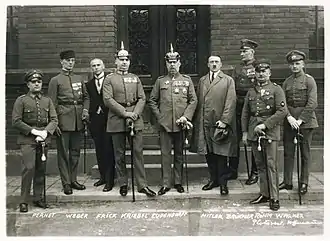Heinz Pernet
Heinz Pernet (5 September 1896 – 30 June 1973) was a German military officer and Erich Ludendorff's stepson. He was a top figure in the Beer Hall Putsch of November 1923. He was among the nine men tried and convicted along with Adolf Hitler and Erich Ludendorff in 1924. He later became an SA-Brigadeführer.[1]
Heinz Pernet | |
|---|---|
 The leaders of the Beer Hall Putsch, 1923, awaiting trial (left to right): Heinz Pernet, Friedrich Weber, Wilhelm Frick, Hermann Kriebel, Erich Ludendorff, Adolf Hitler, Wilhelm Brückner, Ernst Röhm, Robert Wagner. | |
| Born | September 5, 1896 |
| Died | June 30, 1973 (aged 76) |
| Allegiance | |
| Service/ | German Army Sturmabteilung |
| Rank | Lieutenant (German Army) Brigadeführer (Sturmabteilung) |
| Relations | Erich Ludendorff (stepfather) |
Early life
Pernet was the son of Margarethe Schmidt and her husband Karl Maria Anton Robert Pernet. After their divorce, Margarethe took care of Heinz and his two brothers and a sister. In 1909, she married officer Erich Ludendorff, who thus became Pernet's stepfather. From 1914 to 1918, Pernet participated in the First World War, where he served as a pilot, as did both his brothers, who were shot down and killed in the course of the war.
Postwar, Hitler putsch and process
After the war, Pernet was a member of the Guard Cavalry Rifle Division until the spring of 1923, when he moved to Munich. There he came into contact with the NSDAP through his stepfather, an early supporter of the party and acquainted to Adolf Hitler.
In November 1923, Pernet took part in the Beer Hall Putsch in Munich. On the evening of November 8, he participated in the occupation of the Bürgerbräukeller and then picked up his stepfather in his villa, together with Max Erwin von Scheubner-Richter. On Hitler's orders, Pernet seized large sums of money (1,460 trillion Reichsmark) in the Jewish printing house Mülthaler and Parcus on the night of 8 to 9 November in order to distribute them to the putschists in support of the coup d'état.
On the morning of November 9, 1923 Pernet marched to the Feldherrnhalle in the second row of the putschists (behind Hitler, Ludendorff, Scheubner-Richter, Hermann Goering, Kurt Neubauer, and Ulrich Graf).
After the defeat of the coup by the provincial police, Pernet was able to flee. In the spring of 1924 he surrendered himself to the Bavarian authorities. From February 26 to April 1, 1924, the criminal trial for high treason took place before the People's Court of Munich I. The court acknowledged mitigating circumstances. Under the presiding judge George Neithardt he was sentenced to 15 months imprisonment for aiding and abetting treason, but served only 4 months before being pardoned and released.
Later life
From September 15, 1924 to March 31, 1926 Pernet worked as an office worker at the Motor Technology Society in Munich. He then took over a position at the Chemical Study Society in Freiberg from April 15, 1926 to November 30, 1928. From June 1929 to June 30, 1933, he finally worked for Siemens and Halske.
On February 1, 1932 Pernet joined the NSDAP, where he received the party member number 887.088. He also became a member of the Sturmabteilung (SA). On August 31, 1933 he received the rank of SA-Standartenführer - a leadership position as a staff leader in the rank of a standard leader of the SA Brigade 53 in Karlsruhe. Later he was promoted to SA-Brigadeführer.
On March 1, 1935 Pernet took up a position as adjutant of the Reich Governor of Bavaria Franz Ritter von Epp. He held that position until 1938, when he was appointed Chief Adjutant in the staff of the Reichsschatzmeister NSDAP Franz Schwarz and was further promoted to SA-Oberführer. On January 30, 1942, he became SA-Brigadeführer. By that time, the SA had almost completely lost its influence and lacked the manpower nor the support to play any significant role within the structure of the state.
With the end of the war, Pernet was briefly detained by the Allies, but was released in 1946 when the International Military Tribunal at Nuremberg formally judged the SA not to be a criminal organization. He retired to Freiburg, where he lived until his death in 1973.
Pernet married physiotherapist Christine Mathilde (born February 22, 1906 in Reez, died August 29, 1967 in Freiburg) in 1936. They had three children.
References
- "Archived copy". Archived from the original on 2015-05-04. Retrieved 2015-06-07.CS1 maint: archived copy as title (link)
